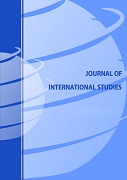EVALUATING THE TRANSITION TO GREEN ECONOMY IN KAZAKHSTAN: A SYNTHETIC CONTROL APPROACH
EVALUATING THE TRANSITION TO GREEN ECONOMY IN KAZAKHSTAN: A SYNTHETIC CONTROL APPROACH
Author(s): Galiya Sansyzbayeva, Zhansaya Temerbulatova, Aknur Zhidebekkyzy, Laura AshirbekovaSubject(s): Geography, Regional studies, Energy and Environmental Studies, Evaluation research, Economic development
Published by: Fundacja Centrum Badań Socjologicznych
Keywords: synthetic control method;the Concept of transition to green economy;CO2 emissions;decoupling effect;Kazakhstan regions;green economy;economic growth;environmental pollution;emissions of pollutants;
Summary/Abstract: In the modern world, due to the growing environmental threats, each state has the task of reducing the anthropogenic impact on the environment. Many countries, especially developed ones, have been seriously studying this problem and are finding solutions. However, in developing countries the situation is different, along with the growth of the economy, environmental damage is growing. The purpose of this article is to evaluate the impact of the existing measures aimed at reducing emissions and to assess the readiness of the regions in Kazakhstan for the transition to green economy. In the article, the effect of adoption of the Concept of transition to green economy on CO2 emissions in Kazakhstan was assessed. Using the synthetic control method, the panel data of Kazakhstan and 30 control countries for 2003-2018 were evaluated. As a result of constructing a counterfactual, it is revealed that the effect of the Concept can be traced in Kazakhstan, however, the trend of annual emissions’ increase remains. The second part of the analysis covers the assessment of the potential of the regions in Kazakhstan for the transition to green economy through assessing the decoupling effect of GRP from pollutant emissions into the atmosphere. For this assessment, the data as of 2005-2018 for 14 regions and 2 cities of republican significance in Kazakhstan are used. The pair correlation between gross regional product and 2 types of environmental pollution is calculated. Based on the results of correlation assessment, the regions were selected that showed the best and the worst results and a detailed analysis of these regions was carried out based on a regression model. The results show a heterogeneous situation in the regions of Kazakhstan, as only in 7 regions out of 16 the effect of decoupling was revealed (high one - only in 4 regions). The authors propose measures to improve the situation in individual regions and in the country as a whole.
Journal: Journal of International Studies
- Issue Year: 13/2020
- Issue No: 1
- Page Range: 324-341
- Page Count: 18
- Language: English

